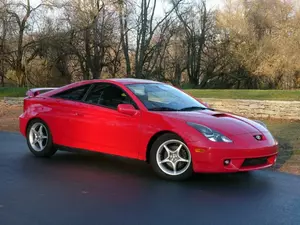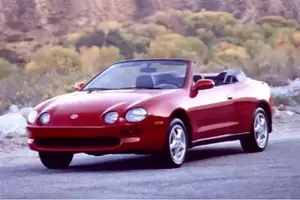
| Vehicle | Curb weight | Difference from world's smallest | Weight to power ratio | 0—60 mph acceleration ratio | Consumption ratio |
|---|---|---|---|---|---|
| 1.8 VT-i 16V |
1070 kg / 2359 lbs |
645 kg (1422 lbs) heavier | 7 kg to 1 hp | 129 kg/s (284 lbs/s) |
139 kg/L (306 lbs/L) |
| 1.8 VVTL-I T-Sport |
1215 kg / 2679 lbs |
790 kg (1742 lbs) heavier | 6 kg to 1 hp | 174 kg/s (384 lbs/s) |
145 kg/L (320 lbs/L) |
| 1.8 i GT- R |
1190 kg / 2624 lbs |
765 kg (1687 lbs) heavier | 7 kg to 1 hp | 168 kg/s (370 lbs/s) | - |
| Vehicle | 1.8 VT-i 16V |
|---|---|
| Curb weight |
1070 kg / 2359 lbs |
| Difference from world's smallest | 645 kg (645 lbs) heavier |
| Weight to power ratio | 7 kg to 1 hp |
| 0—60 mph acceleration ratio | 129 kg/s (284 lbs/s) |
| Consumption ratio |
139 kg/L (306 lbs/L) |
| Vehicle | 1.8 VVTL-I T-Sport |
| Curb weight |
1215 kg / 2679 lbs |
| Difference from world's smallest | 790 kg (790 lbs) heavier |
| Weight to power ratio | 6 kg to 1 hp |
| 0—60 mph acceleration ratio | 174 kg/s (384 lbs/s) |
| Consumption ratio |
145 kg/L (320 lbs/L) |
| Vehicle | 1.8 i GT- R |
| Curb weight |
1190 kg / 2624 lbs |
| Difference from world's smallest | 765 kg (765 lbs) heavier |
| Weight to power ratio | 7 kg to 1 hp |
| 0—60 mph acceleration ratio | 168 kg/s (370 lbs/s) |
| Consumption ratio | - |

| Vehicle | Curb weight | Difference from world's smallest | Weight to power ratio | 0—60 mph acceleration ratio | Consumption ratio |
|---|---|---|---|---|---|
| 2.2i GT |
1165 kg / 2569 lbs |
740 kg (1632 lbs) heavier | 9 kg to 1 hp | - |
123 kg/L (271 lbs/L) |
| Vehicle | 2.2i GT |
|---|---|
| Curb weight |
1165 kg / 2569 lbs |
| Difference from world's smallest | 740 kg (740 lbs) heavier |
| Weight to power ratio | 9 kg to 1 hp |
| 0—60 mph acceleration ratio | - |
| Consumption ratio |
123 kg/L (271 lbs/L) |

| Vehicle | Curb weight | Difference from world's smallest | Weight to power ratio | 0—60 mph acceleration ratio | Consumption ratio |
|---|---|---|---|---|---|
| 1.8 i 16V |
1170 kg / 2580 lbs |
745 kg (1643 lbs) heavier | 10 kg to 1 hp | 130 kg/s (287 lbs/s) |
158 kg/L (348 lbs/L) |
| 2.0 Turbo 4WD |
1390 kg / 3065 lbs |
965 kg (2128 lbs) heavier | 6 kg to 1 hp | 240 kg/s (529 lbs/s) |
146 kg/L (322 lbs/L) |
| 2.0 i 16V |
1255 kg / 2767 lbs |
830 kg (1830 lbs) heavier | 7 kg to 1 hp | 163 kg/s (359 lbs/s) |
153 kg/L (337 lbs/L) |
| Vehicle | 1.8 i 16V |
|---|---|
| Curb weight |
1170 kg / 2580 lbs |
| Difference from world's smallest | 745 kg (745 lbs) heavier |
| Weight to power ratio | 10 kg to 1 hp |
| 0—60 mph acceleration ratio | 130 kg/s (287 lbs/s) |
| Consumption ratio |
158 kg/L (348 lbs/L) |
| Vehicle | 2.0 Turbo 4WD |
| Curb weight |
1390 kg / 3065 lbs |
| Difference from world's smallest | 965 kg (965 lbs) heavier |
| Weight to power ratio | 6 kg to 1 hp |
| 0—60 mph acceleration ratio | 240 kg/s (529 lbs/s) |
| Consumption ratio |
146 kg/L (322 lbs/L) |
| Vehicle | 2.0 i 16V |
| Curb weight |
1255 kg / 2767 lbs |
| Difference from world's smallest | 830 kg (830 lbs) heavier |
| Weight to power ratio | 7 kg to 1 hp |
| 0—60 mph acceleration ratio | 163 kg/s (359 lbs/s) |
| Consumption ratio |
153 kg/L (337 lbs/L) |

| Vehicle | Curb weight | Difference from world's smallest | Weight to power ratio | 0—60 mph acceleration ratio | Consumption ratio |
|---|---|---|---|---|---|
| 1.8i 16V |
1200 kg / 2646 lbs |
775 kg (1709 lbs) heavier | 10 kg to 1 hp | - | - |
| 1.6 STi |
1200 kg / 2646 lbs |
775 kg (1709 lbs) heavier | 11 kg to 1 hp | 114 kg/s (251 lbs/s) |
171 kg/L (377 lbs/L) |
| 2.0i 16V |
1200 kg / 2646 lbs |
775 kg (1709 lbs) heavier | 9 kg to 1 hp | - | - |
| 2.0 i 16V |
1200 kg / 2646 lbs |
775 kg (1709 lbs) heavier | 8 kg to 1 hp | 152 kg/s (335 lbs/s) |
156 kg/L (344 lbs/L) |
| 2.0 i 16V Turbo 4WD |
1420 kg / 3131 lbs |
995 kg (2194 lbs) heavier | 7 kg to 1 hp | 192 kg/s (423 lbs/s) |
151 kg/L (333 lbs/L) |
| Vehicle | 1.8i 16V |
|---|---|
| Curb weight |
1200 kg / 2646 lbs |
| Difference from world's smallest | 775 kg (775 lbs) heavier |
| Weight to power ratio | 10 kg to 1 hp |
| 0—60 mph acceleration ratio | - |
| Consumption ratio | - |
| Vehicle | 1.6 STi |
| Curb weight |
1200 kg / 2646 lbs |
| Difference from world's smallest | 775 kg (775 lbs) heavier |
| Weight to power ratio | 11 kg to 1 hp |
| 0—60 mph acceleration ratio | 114 kg/s (251 lbs/s) |
| Consumption ratio |
171 kg/L (377 lbs/L) |
| Vehicle | 2.0i 16V |
| Curb weight |
1200 kg / 2646 lbs |
| Difference from world's smallest | 775 kg (775 lbs) heavier |
| Weight to power ratio | 9 kg to 1 hp |
| 0—60 mph acceleration ratio | - |
| Consumption ratio | - |
| Vehicle | 2.0 i 16V |
| Curb weight |
1200 kg / 2646 lbs |
| Difference from world's smallest | 775 kg (775 lbs) heavier |
| Weight to power ratio | 8 kg to 1 hp |
| 0—60 mph acceleration ratio | 152 kg/s (335 lbs/s) |
| Consumption ratio |
156 kg/L (344 lbs/L) |
| Vehicle | 2.0 i 16V Turbo 4WD |
| Curb weight |
1420 kg / 3131 lbs |
| Difference from world's smallest | 995 kg (995 lbs) heavier |
| Weight to power ratio | 7 kg to 1 hp |
| 0—60 mph acceleration ratio | 192 kg/s (423 lbs/s) |
| Consumption ratio |
151 kg/L (333 lbs/L) |